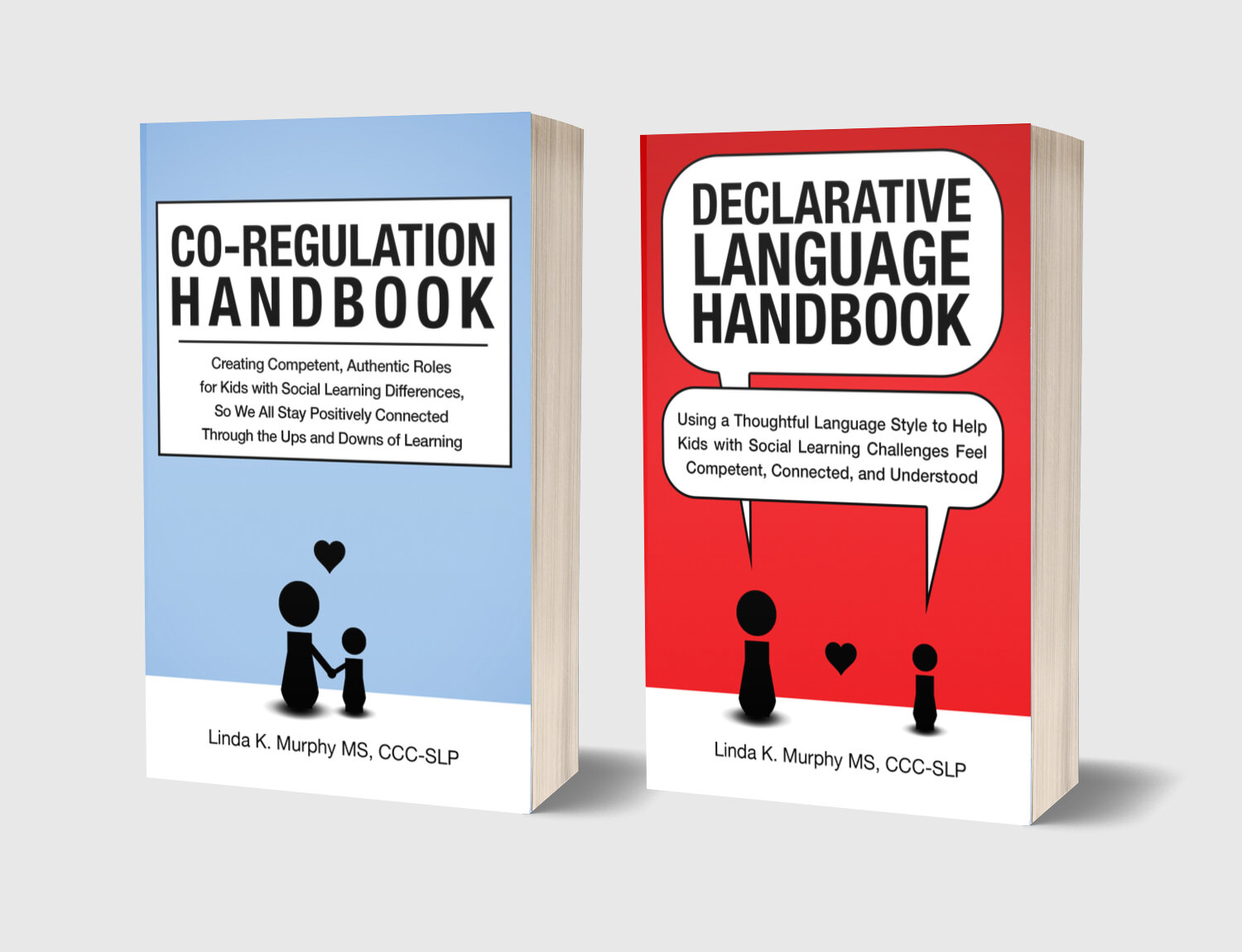A Framework for Teaching with Declarative Language & Co-Regulation
I like this definition:
A framework describes factors believed to influence an outcome. It provides a big picture overview of various descriptive categories and how they might relate to one another. (Crockett, 2017)
I am also excited about it because as I write more and more, work with individuals across time, and talk with families and educators about how to implement the strategies of declarative language and co-regulation across different contexts and in different ways, I see a framework developing.
I know that the more I can explain this framework, the easier it will be for everyone to use it, across settings and in different ways.
I know it will also help us all see the big picture of where we are going and how we will get there.
And it will help us really see how what we do today, creates learning opportunities for tomorrow.
With this framework, I am thinking about three areas:
Skill Building
In-the-Moment Tools
Constructing a Thoughtful Narrative Over Time
Within each area we use declarative language and co-regulation in different ways, but each interacts with each other.
I’ll expand upon these areas below. Ready to go?
Skill Building
This means first and foremost, deciding which skill you want to work on!
What you work on is always up to you. And it is possible to work on more than one thing at a time.
But it will be helpful to identify & break down one area at a time, so you know what you are going for, and can observe and feel progress over time.
The skill you chose could be:
learning how to make a bed
or it could be
learning how to manage your time so that you are able to make your bed before heading out the door the morning
or it could even be
learning how to persist through something you know how to do (making your bed), but don’t really enjoy.
Identifying and naming where you want to help your learner build or strengthen competence is key.
In this area, we use declarative language to:
think out loud while explaining a process, or explaining how we may approach an idea
describe how to do something
thoughtfully guide next steps
invite problem solving as our learners our ready
set realistic expectations
and
emotionally connect along the way
We use co-regulation to:
define competent roles for our learner within that process
create competent-authentic-contingent roles as we practice it together
and
emotionally connect along the way
And, we adjust our level of support as we see our learners grow.
2. In the Moment Tools
While working to build new skills, we need tools in the moment to help our learners regulate when emotions are escalating, to set thoughtful limits when this is called for, and to help with positive forward momentum when under time constraints. Our In-the-Moment Tools include:
declarative statements that mirror or validate (and therefore support emotional connection)
silence and processing time
identifying competent-authentic-contingent roles in the moment (which may be different than usual)
declarative statements to set thoughtful limits when needed
declarative statements that model self-advocacy (for internal needs or other types of help)
3. Constructing a Thoughtful Narrative Over Time
We are creating a narrative with our learner that will develop over time. This means, we are planning ahead when possible, reflecting back to decide how and when to change things up, and making a point to help store important memories in the present.
Sometimes we include our learner in this process, but sometimes it is OUR planning and reflection that is most important.
This is how we thoughtfully lay the groundwork for our learners to build skills and gain competence over time.
In this area, we are thinking about Episodic Memory!
Here, we use declarative language + processing time to:
remember together and plan ahead as a team
pause, and store important memories in the present moment
build self-awareness across time
We use co-regulation to:
establish memories as a team across the past, present and future
And, we use both to:
strengthen our emotional connection over time
And finally…
Our goal with this framework?
To create an environment for our learners where they always feel competent, connected and understood, as they develop skills across their lifetime, with our love, support and encouragement.
Stay tuned for future posts where I provide more explanation and details on this framework, and this narrative of ideas unfolds! If there is area where you want more information first, please let me know!
And you can download all of these visuals here:
Have a great week!
Want CEU’s?
Come learn about these concepts with me during a live webinar next Monday, March 13!
Sunday Snippets of Support
If you like them, you can receive them directly to your inbox here!















